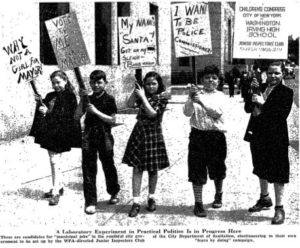STS.080J/11.151J Youth Political Participation
Spring 2023: Mondays 1-4pm
3-0-9 units
HASS-H
Instructor: Professor Jennifer S. Light
Course description
Recent events in the United States have thrust young people into the spotlight as actors on the political stage. From the student-organized March for Our Lives, which rallied for gun control following school shootings in Parkland, Florida, to the youth-led Sunrise Movement’s call to stop climate change and create jobs, it’s impossible to ignore how citizens too young to vote are finding ways to express their views. This activism has surprised, delighted, and sometimes frightened adults and peers—prompting reflections about the unprecedented engagement of American youth today, and their creative use of media for political mobilization.
In fact, American youth have long been political actors—and some evidence points to even greater influences on prior generations’ public affairs. This course places contemporary youth activities in perspective by surveying young Americans’ political participation since the middle of the 19th century. We explore how and why ideas about youth as a biological and social category have changed over time, and then turn to investigate trends in youth political activism during specific historical periods.
STS.080/11.151J provides both a survey of and a hands-on introduction to historical research on youth who, like other marginalized populations from the American past (from women and immigrants to slaves and working classes) did not write the first draft of their own histories. We aim to access youth voices, including those of MIT and other local students, through the media they produced–from amateur newspapers to tweets. In keeping with the course theme, our final weeks are devoted to project work on an assignment created and approved by students.
Course Objectives
Students will leave the course understanding
- how age (like gender and race) is a biological and cultural category that varies by time and place—offering insights into claims from scientists, parents, educators and youth themselves about young peoples’ capabilities.
- how to contextualize contemporary claims about youth activism, to understand what is new versus what merely lacks prior historical coverage.
- how to collect and analyze historical sources through hands-on learning opportunities that make use of local resources including the MIT library, archive, museum and community.
- how writing history can be a political act. Although this is not a course on how to be an activist, for those with such aspirations you’ll understand history as a resource for your work.
